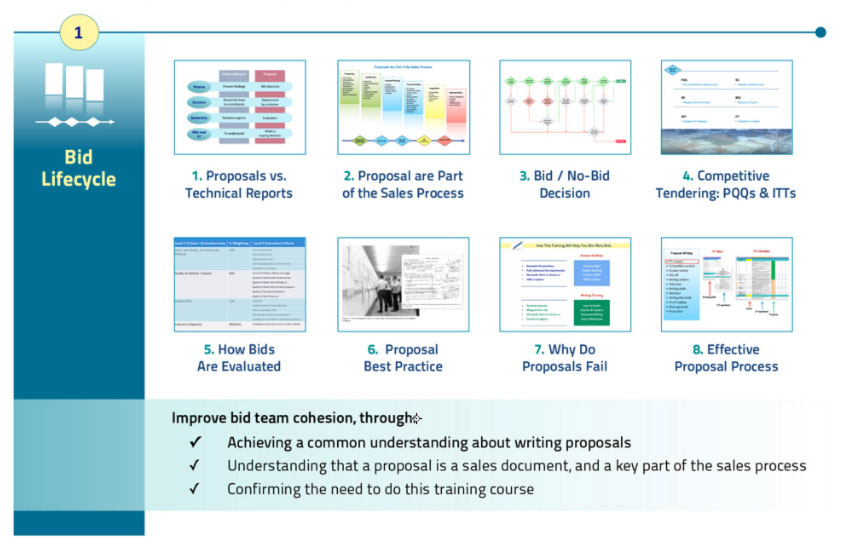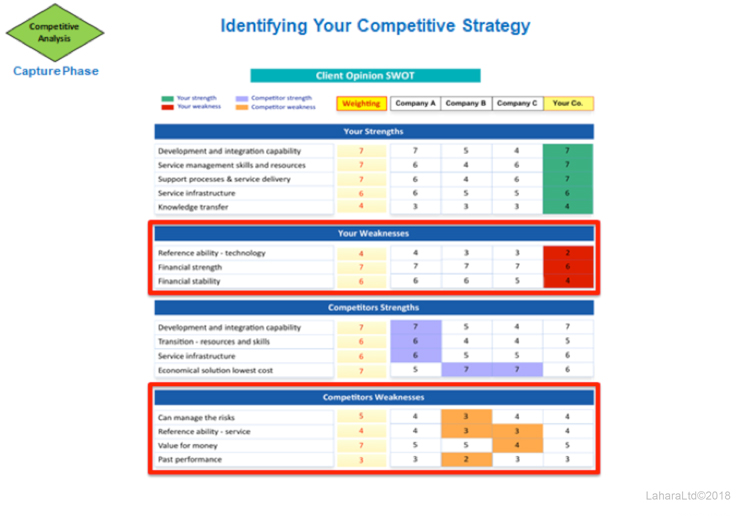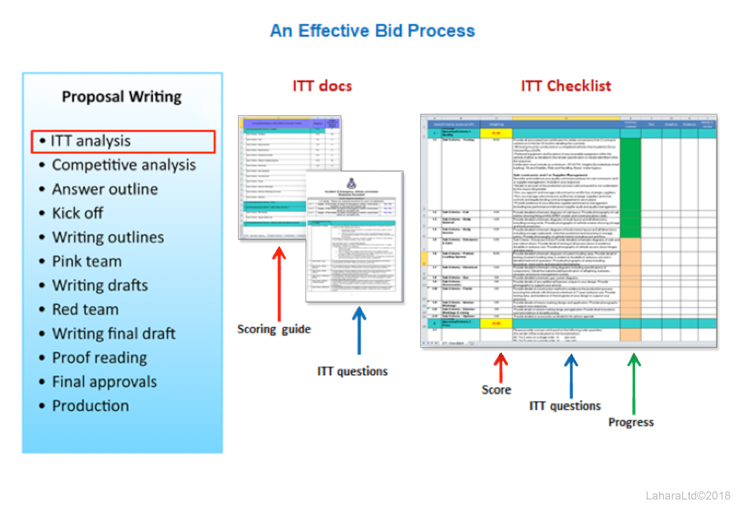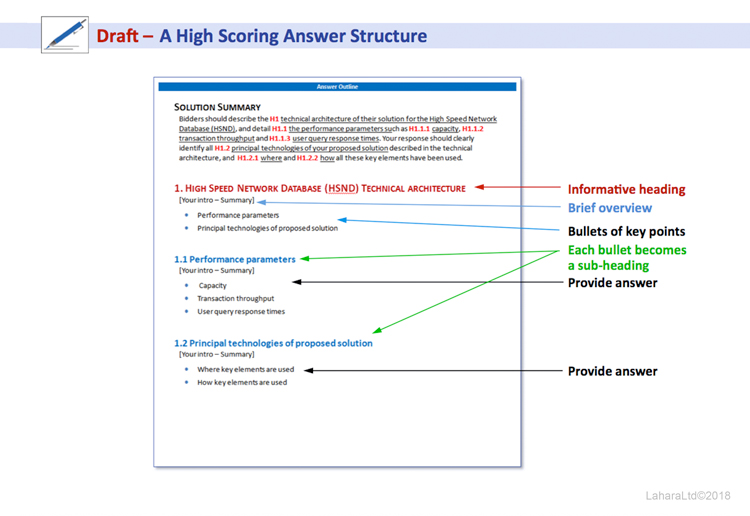Bid teams are often made up of subject matter experts (SMEs), technical writers and sales professionals who don’t know how to write high scoring, easy-to-evaluate answers.
To win, it is vital for the bid team to have a clear strategy in place so they can launch into effective action when the next bid arrives. They need a proven approach for analysing the opportunity and a practical, step-by-step guide to produce an effective selling document.
Learn bid writing techniques that will ensure you are answering the question, and to enable fast comprehension by the evaluators.
To help embed the training and ensure the best possible return on your investment we can provide 1:1 coaching during a live bid.
I thought I knew how to write bids, but I was wrong.
This course has really helped me learn the writing skills which will lead to more concise, winning answers.”
Winning Combination in 3 Steps
1. Strategy
Identify your competitive strategy
2. Process
Use an effective bid process
3. Skills
Learn to write high-scoring answers
What you will achieve from this training
- Know how to analyse any question through creating the right answer structure
- Be able to draft and edit, high-scoring client-focused answers
- Understand the critical importance of conducting effective team reviews.
Get your bid writing team on the same page
Our specialist training will also improve bid team cohesion through the development of a common understanding about the bid lifecycle and what it takes to craft a winning solution.
Listed below is an outline for the nine training modules considered essential for writing a winning bid.
Who is the training for?
Developed specifically for bid and proposal managers, subject matter experts (SMEs), technical writers and sales and business development professionals to produce winning bids.
The course is tailored to the meet needs and skills of your team and teaches the key steps your team needs to take to produce a high scoring bid.
Lahara’s Bid Writing Training delivers a modular-based course, with templates and checklists, which can be conducted and implemented during a live bid.
Customising your training
1. Discuss your issues and needs with us
2. We help you choose which training modules best meet your needs
3. Note: Our recommended 3 core modules will take one day. Any additional modules required will be added to Day 2 of the training.
If you don’t get the marks, you can’t win the bid
Is your bid writing team getting low scores for their written answers, and you can’t see the reason why?
To win a public sector bid, you have to score the highest marks. Price is always a factor, but it is often the scores for your written answers that will decide it.
Does your team know how to get high scores? If they don’t, then your business is investing a lot of time and effort in failing bids.
Customise the training to suit your needs
We will help you choose modules to fulfill your training needs1. Bid Lifecycle
- Achieving a common understanding about writing proposals
- Demonstrating proposals as a key part of the sales process
- Understanding the aims of this training course
4. Proposal Structure
Develop executive summary:
- Step-by-step guide to developing a powerful executive summary
- Client-focused approach to presenting your solution
- Understanding the importance of answering each question
7. Effective Reviews Process
Raise your game – team reviews:
- Verifying your response is 100% compliant and has the right answer strategy
- Reviewing and scoring final drafts as if you are the client
- Eliminating last minute panic in time pressured environment
2. Answering the Question
- A clear, structured process for analysing each question
- Creating placeholders for the required information
- Developing a strategy to gain the highest score
5. Competitive Positioning
- Identifying the client’s key buying criteria
- Using SWOT techniques to assess the proposal battleground
- Developing your key proposal messages to help you win
8. Document Submission
Ensure on time, error-free bid:
- Using a proofreading checklist and ensuring all answers proofread
- Print production planning, if a printed version is required
- Testing the submission portal, and executing an upload plan
3. Writing the Answers
Consistently score highly:
-
Concise, client-focused writing
-
Effective use of graphics and captions
-
Ways to create answers that are easy-to-evaluate and score
6. Bid Preparation
- Agreeing the proposal strategy for a specific bid
- Ensuring your filing system, checklist, evidence and graphics are ready
- Executing a proven plan when the bid arrives
9. Lessons Learned
- Deconstructing the bid; reusing the reviewed content
- Asking for a client debrief when you win or lose
- Capturing lessons learned and executing a remedial action plan
Learn more about the modules
Click+ to expand text
1. Bid Lifecycle
Every bid writing team has a different level of understanding about writing bids, and how that fits into the sales process. To achieve a high scoring bid, your team must understand that a proposal is a sales document and part of the bid lifecycle.
This module is designed to improve bid team cohesion through in-depth understanding, and a common knowledge about: writing proposals; key stages of the sales and bidding process; and pre-bid and bid no-bid qualification processes.
Client requests for help in understanding how bid writing fits into the sales process, led us to develop this set of 8 Bid Lifecycle mini-modules outlined below, that will:
-
- Define the position of a proposal in the sales process
- Provide an overview of competitive tenders
- Look at why proposals fail
- Describe an effective proposal production process
2. Answering the Question
To win, it is essential that the bid writers are actually answering the question. Most think that they are, but the scores they receive in public sector bids indicate that they are not.
Even with commercial bids, although often they do not publish the scoring criteria or the scores, you can rest assured that the answers are scored.
To ensure your team is answering the question, they need a:
- Clear structured process for analysing each question
- Way to create placeholders for the required information
- Strategy for each question to gain the highest score
3. Writing the Answers
For your bid writing team to write consistently high quality answers, they need a clear, structured process that begins with the answer outline process.
Once the answer outline has been populated, reviewed and approved, then the drafting stage begins.
And that is where the problems really starts, with writer’s block and overwhelm, to name just a few.
This module provides a step-by-step process to consistently produce:
- Well-structured answers, that make effective use of graphics and captions
- Easy-to-read, customer-focused writing
- Answers that are easy-to-evaluate and score
4. Proposal Structure
Creating an Executive Summary
There are many schools of thought about writing executive summaries, and debates about who writes them, when they should be written and how long they need to be. The key is to get the structure right, and that is to write about what the customer is wanting, the results they are looking for, what your solution is, and the evidence you can provide.
Developing a Solution Overview
The next section is about your solution. It needs to provide an overview of the solution, followed by the proposed solution details. You also need to highlight any added value you can bring beyond what the client has requested, including the ways the client can take advantage of that added value.
Answering the Question?
Most bid writers think they are answering the client’s questions, and are baffled when they get a low score. This mini-module will open their eyes when they see how a client was failing at the PPQ stage. They were not able to progress to receiving an ITT within a key focus market. The team will see my analysis and solution of an actual, but disguised, example answer.
5. Competitive Positioning
Creating key proposal messages that will resonate with the client, demands a keen understanding of your competitive positioning.
Your team can transform their proposals into effective, selling documents through: implementing the right bid strategy to beat your competition, using SWOT techniques to identify the proposal battleground, and developing relevant key proposal messages that drive home why the customer should choose you.
This module will explain to the SMEs the work the bid management team has done to produce the win strategy and the key proposal messages. It is a very good way to educate them, and gain their informed buy-in into the process.
Click+ to expand text
6. Bid Preparation
(Text Updating – Website under construction)
7. Effective Reviews Process
This module introduces an effective way to significantly raise your game, by implementing team reviews.
It provides an overview on conducting timely reviews on answer outlines and drafts.
The aim is to verify your answer outline is 100% compliant, and has the right answer strategy and content, before committing time to writing the draft.
The next stage is to review and score your final drafts, as if you are the customer, using a team of independent reviewers.
This approach will dramatically raise the level of written responses and eliminate last minute panics in the time-pressured, bid response environment.
8. Document Submission
(Text Updating – Website under construction)
9. Lessons Learned
(Text Updating – Website under construction)
Thank you! I just want to have a quick rave about the training yesterday delivered by Rick.
It was very interesting, engaging and informative and provided a real insight into how to deliver a successful bid. More importantly I felt inspired to get more involved and now feel much better equipped as a subject matter expert to deliver the right content for the bid process. I don’t think I was alone on this. Very impressed!
Rick is obviously very skilled in this area and fully committed to helping us get through the next stage of our bid.
He was prepared & organised for the course, achieved his stated objectives and his skills were effective.
Learning about how best to resource and manage the proposal process effectively, structuring answers and bid/no bid were all really useful processes.
The outlining of questions was extremely useful. It’s something I thought I knew how to do already, but I was wrong, and this course has really helped me learn this skill which will lead to much better, and winning answers.
An excellent training of real value. Very thought provoking towards other sales areas. Most useful part of the training was: layout, SWOT, outlining.
Rick is a TOP bloke!
The structured approach to responding to a tender and following an organised process was really useful.




